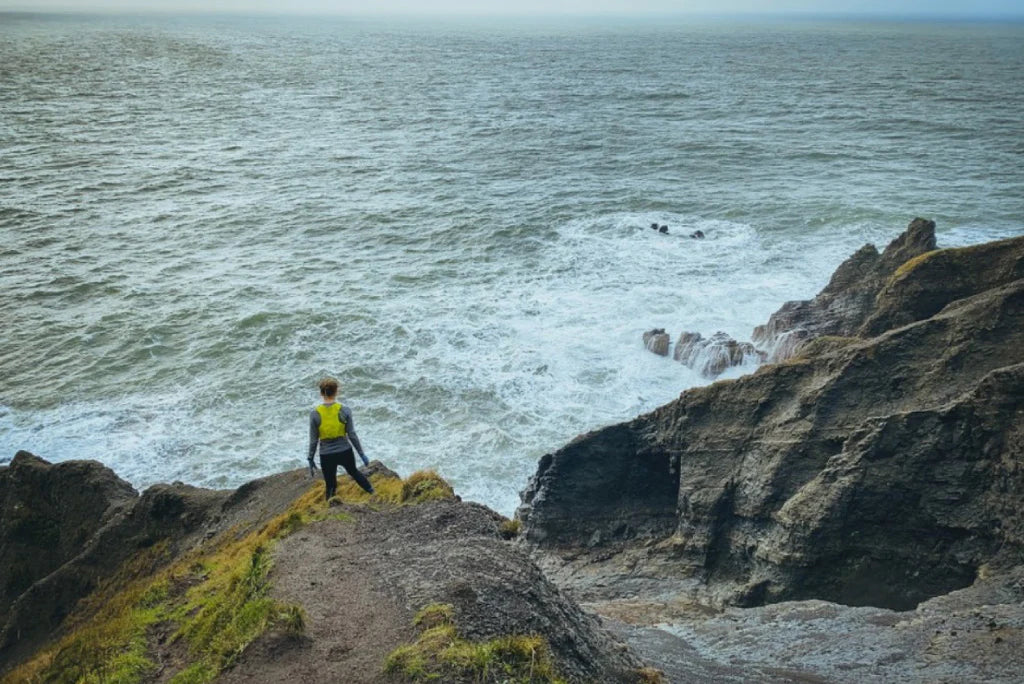A Runner’s Role in the COVID Crisis

By Jason Mazurowski
Somewhere on the other side of the world, in the waning weeks of our last decade, a fragment of genetic material bound by protein infiltrated its first human cells. It had been bouncing around inside of a bat or a pangolin and perhaps myriad other mammalian hosts – copied and recopied millions of times before. It didn’t take long, only a matter of weeks, before that same chain of nucleotides, unbound by international borders, made its way to northern Vermont and began replicating inside my own lungs.
When rumblings of a looming catastrophe first began, I had imagined myself weathering the pandemic with a sense of stoicism. I had already considered myself a master of social distancing – a picture of good health. Thirty-one years old, a field biologist by training, my job required me to be alone in woods much of the time. My usual hobbies included baking sourdough, cultivating mushrooms, brewing beer, and engaging in long bouts of grueling activity in forests fields and mountains. I didn’t foresee my life changing all that much.
Quarantine was going to be a breeze, I’d hunker down and read a couple of books, bake a few loaves of bread, and explore new, hidden places to run. Even if COVID-19 were to find me somehow, I was convinced that my immune system would have something to say about it. I hadn’t seen a doctor or even experienced so much as a sniffle in years.
But by late March, my attempts to remain stoic and stalwart began falling short as it was becoming more and more apparent that no one was going to come out of this unscathed. The economic fallout was threatening my summer contracts, trailheads were closing, my supply of flour was dwindling, and my roommate – a health-care worker – had tested positive for COVID-19.
Even as all these challenges presented themselves, I considered myself one of the lucky ones. Not lucky, of course, to have become infected, but rather lucky to be young, healthy, and physically able to fend off an illness that changed the world. I felt gratitude for all those impromptu hours of self-reflection, and for a community that somehow felt closer as the weeks of isolation passed by, and the distance traveled from my bed diminished.
As the illness dragged on over the course of two weeks, I couldn’t help but find parallels between battling the virus and running an ultra. Symptoms would come and go in a seemingly-endless, alternating series of highs and lows – but the highs never seemed to get any better, and the lows became progressively worse. There were times that I knew my body needed food, water, or electrolytes, but I didn’t feel well enough to eat, my stomach turned at the thought. I found myself in a constant state of discomfort – aches, pains, chills and sweats.
While I managed the discomfort alone, slogging through, wondering how many more days I had left to endure, I still felt that same sense of community that we all feel during a race, as gifts and groceries began appearing on our doorstep. On race day there is a pervasive, unspoken respect for anyone – even our competitors – who rise to the occasion to overcome challenges alone, but also together.
The entire world is in this. No one will be coming out unscathed. We’re all in the middle of race that none of us signed up for. There are no winners, and there is no finish line in sight. All that we can do is endure, and get through it alone, but together. Despite some of the deep divides in this country, there is still an unspoken mutual admiration for anyone who has risen to their respective challenges – rebuilding a curriculum into an online format, stocking grocery shelves, navigating unemployment, or donning a re-used N-95 mask and going to work.
As runners, what is our role in all of this? How can we overcome not only the physical challenges, but also the mental and social repercussions brought about by isolation, uncertainty, and discomfort? How can we help those who we care about get through this, without being able to physically support them?
I suspect we’ll do what we always do. If – and when – we overcome our own trials and tribulations, we’ll celebrate and start recovering, in our own ways. Then we’ll stick around for a while, cheering on each person as they confront their own challenges, cross the finish line, and complete their own journeys – alone, but together.

Jason Mazurowski is a trail runner, field biologist and writer living in Burlington, Vermont.